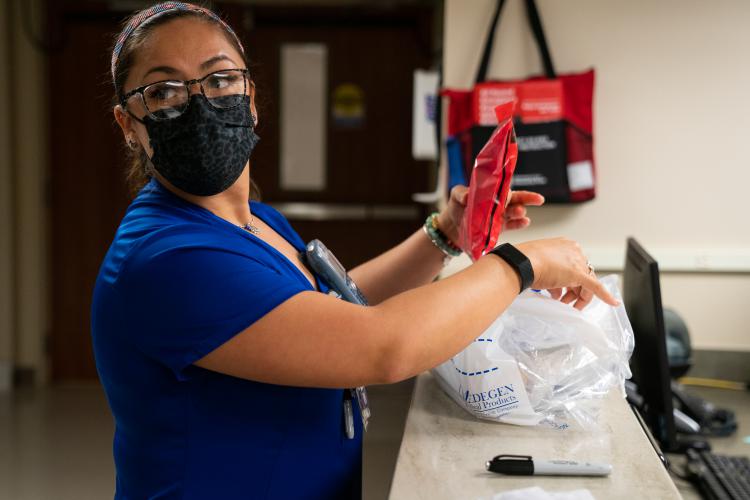
You learn a lot about who you can count on when times are tough. And, with their team depleted as its workload was spiraling out of control, things got pretty rough over the past year for the small but tight-knit Renal Dialysis team at JPS Health Network.
While most people seem to think of COVID-19 as primarily a respiratory disease, the virus also plays havoc with the kidneys. That caused the dialysis team to be stretched to its limits, not only for an increased demand for dialysis, but also because COVID forced its members to have to work a whole lot longer and harder to treat infected patients.
“We had seven people on our team and four of them ended up getting COVID,” RN team lead David Hanna said. “Two of them were hospitalized. But the patients just kept on coming for months at a time. Sometimes I don’t know how we made it through. But our nurses were determined never to give up, and we eventually did make it through, together, through sheer will.”
"The job had to get done and we had to do it. We couldn't let these patients -- or each other -- down."
Typically, dialysis treatments are completed in a long, quiet room on the fourth floor of the JPS Patient Tower, according to Elisabeth Rodgers, Director of Clinical Services at the health network. There, eight patients can be attended to at once as their treatment takes its course over a period of four hours.
“Because we had a lot of patients with COVID that had to be isolated, we had to start doing roll outs,” Rodgers said. “Roll outs are treatments that are done at bedside with a 1:1 nurse-to-patient ratio.”
Roll outs were tough on team members because they require much more work for nurses who were going from room to room instead of doing several dialysis treatments in one place. That meant there was more time spent getting in position to care for patients. Meanwhile, team members had to work around the maintenance schedules of the delicate machinery used to cleanse patients' blood.
In January of 2020, JPS handled 21 dialysis roll outs out of 383 treatments. By May, 127 of 380 cases were roll outs. In October and December, COVID’s impact on dialysis reached its peak with 174 roll outs each month.
“During the COVID months, there were so many roll outs that the machines were overused and went out,” Rodgers said. “At the end, we had one borrowed machine and one JPS machine that were still working.”
RN Jenn Velasquez has worked at JPS in a variety of different roles over the past 15 years. She described herself as a “JPS lifer” who started as an Emergency Medical Technician in the Emergency Department before working her way up through the ranks as a paramedic, a dialysis tech and, eventually a nurse. When COVID struck, she found herself donning personal protective gear for 12 hours or more at a time, bravely stepping through the door on isolation rooms that housed infected patients.
“Sometimes, I don’t know how we kept going,” Velasquez said. “All we knew is that there wasn’t any other choice. The job had to get done and we had to do it. We couldn’t let these patients – or each other – down, no matter what it took. We’re a really tight team here, and we’re going to support each other, no matter what.”
With the number of COVID cases at JPS finally winding down over the past few months, Hanna said he’s thrilled to see his team still intact.
“I’m proud to say, even after all we’ve been through, that we didn’t lose a single person,” Hanna said. “Not one of them decided to give up and go do something else. In fact, we’ve added an eighth person. We really hope we never go something like we did for the last year again. But if we have to, we’ll be ready.”
